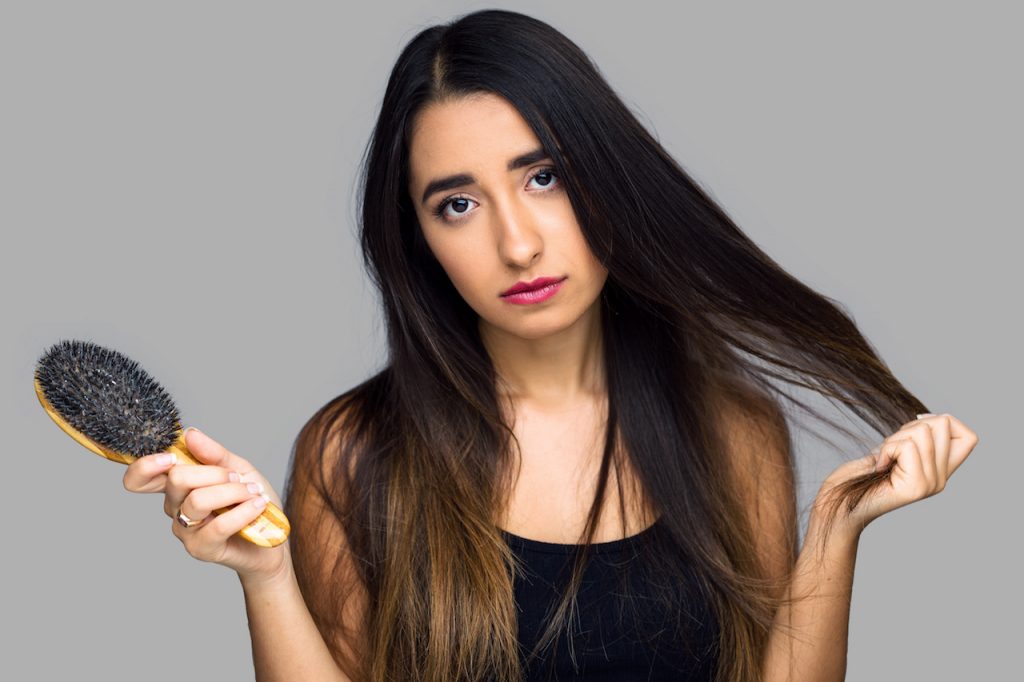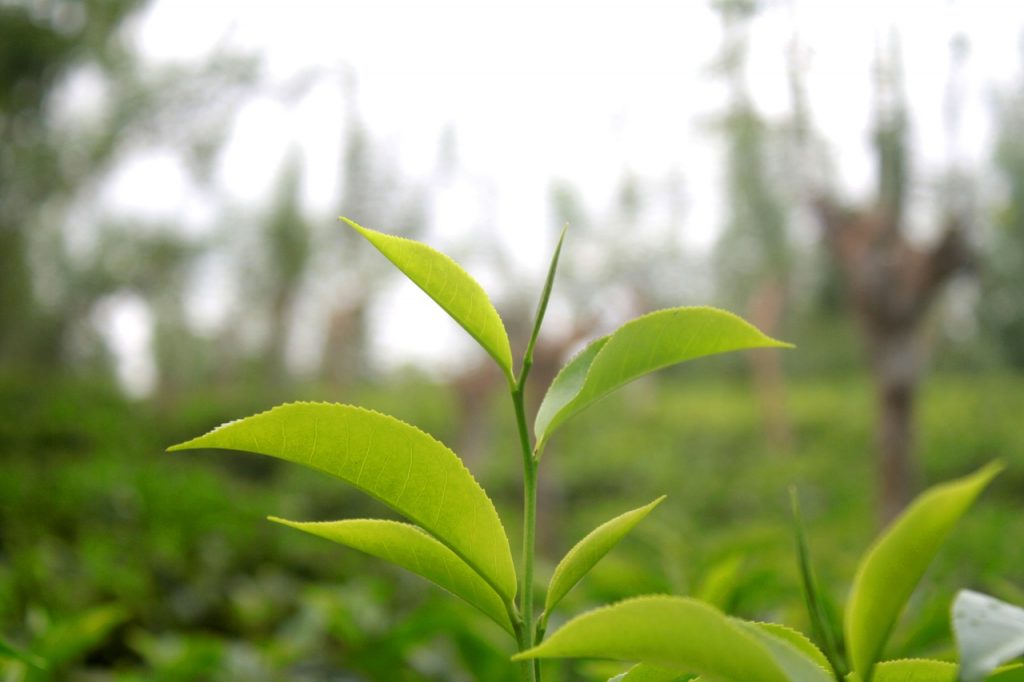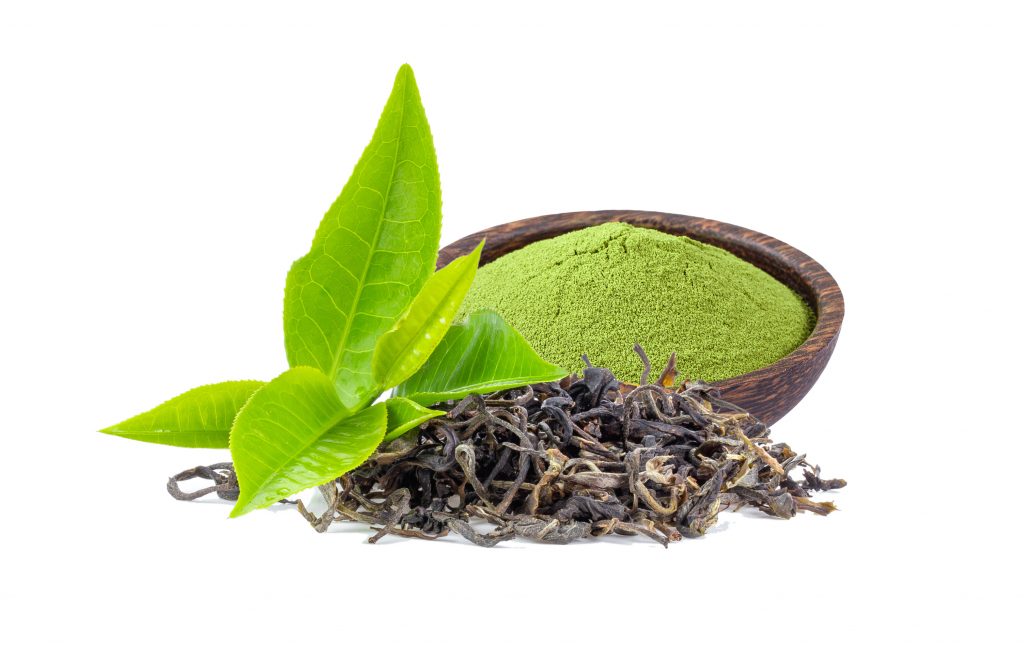Published on February 5, 2018. Last Updated on July 21, 2021.
Green tea extract (GTE) is a concentrated antioxidant compound derived from Camellia sinensis leaves. Unlike the leaves used for oolong and black teas, these leaves do not undergo an oxidation process. The consumption of these leaves is often linked to certain health benefits. Recently, however, researchers turned to examine green tea for hair growth. Below is a compilation of the latest research on green tea benefits for hair.
Green Tea Hair Loss General Information
Androgenic alopecia is hereditary baldness. It can affect both men and women. A gradual recession of hair usually characterizes the condition.
In men, androgenic alopecia usually begins at the top of the head and works its way back. Such is the reason why men are experiencing genetic hair loss suffer from a receding hairline. On the other hand, women experience thinning near the center of the head where the part is placed. The front hairline is not ordinarily affected in female pattern baldness. Female pattern baldness can be harder to treat due to diffuse thinning. It has been shown that thinning hair is highly susceptible to dihydrotestosterone ( DHT ). DHT is the main culprit in the causation of androgenic alopecia.

Epigallocatechin gallate (EGCG) is a catechin that is viewed as the driving force behind the many benefits of green tea. This bioactive compound is a natural phenol and antioxidant. Antioxidants can safely interact with free radicals. Free radicals are compounds that can speed up the aging process. Thus, these compounds can damage hair health. By slowing down the rate of cell degeneration, anti-oxidants could be helpful even when hair loss is genetic. Studies have shown the positive effects of EGCG in hair loss treatment (1-4).
Studies About Green Tea For Hair Growth (GTE)

Skinmed (2012) published a review of twenty studies that observed the use of green tea in dermatology in terms of hair growth. Among the studies were in-vitro (in a test tube) and in-vivo (in a living organism) experiments that analyzed the effects that green tea extracts have on hair (1). In the end, scientists concluded that green tea can be effective in treating androgenetic alopecia.
Green Tea for Hair: A More In-depth Investigation Using In-Vivo and In-Vitro Methods
A study conducted by Phytomedicine (2007) measured the effectiveness of EGCG green tea hair growth in a test tube (in-vitro) and a living organism (in-vivo). The experiment determined the potential benefits of EGCG hair loss treatment on human dermal papilla cells (DPCs) in-vitro and in-vivo (2). Dermal papilla cells regulate hair follicle growth and development.
The investigation found green tea extract hair growth was noticeable in both in-vivo and in-vitro experimentation. The study concluded that EGCG promotes hair growth through its anti-apoptotic (programmed cell death) effect on dermal papilla cells.
Hair Products Containing Green Tea

- Dr. UGro Gashee Natural Botanical Hair Products utilize the purest source of Green Tea that is extracted using holistic methods.
- A proprietary cold-formulation process was used to avoid the damaging effect of heat on the beneficial molecules.
- Avoiding harsh chemicals, preservatives and fragrances ensure that the full measure of green tea benefits are holistically delivered to your hair, just as nature intended.
- Dr. UGro Gashee products are conceived, formulated, and tested by a board-certified dermatologist.
Another Study on EGCG Hair Growth
The Journal of the National Medical Association published an investigation in 2005 (3). The study divided mice suffering from hair loss into two groups. Researchers gave rodents in Group A the water that had polyphenol extracts derived from dehydrated green tea. Group B subjects received regular drinking water for treatment. Researchers administered treatment to both ranks for six months.
In the end, 33% of those mice in Group A experienced significant progress due to green tea extract treatment. Subjects in Group B did not encounter hair growth after six months of drinking regular water with no green tea extracts.

Green Tea Extract Hair Growth: A Further Explanation for Men
Men experience five alpha-reductase activity that is necessary for sexual differentiation. Although a vital enzyme in steroid metabolism, the chemical contributes to alopecia. A study has shown that EGCG found in green tea is a natural remedy that slows down the production of 5 alpha-reductase (4)—in other words, using EGCG by way of green tea as a hair loss treatment method could potentially hair growth. Green tea extract hair growth warrants further study to determine the dosing necessary to produce the effect. It is important to note that inhibiting 5 alpha-reductase activity could negatively affect sexual differentiation in men. Women also have DHT, although in smaller concentrations. Thus, it is likely that a topical route of administration might be the way to go as the amount of green tea needed to be consumed for effect may be too much for the average individual. It would also carry a lesser potential of causing sexual dysfunction.
Potential Side Effects of Green Tea
For adults, green tea usually does not cause any side effects. It is mostly safe for oral consumption or when applied to the skin.
However, there are some concerns that may lead to complications for some. Because green tea contains caffeine, it may cause anxiety, nausea, or an upset stomach for those severely sensitive to caffeine. It may also increase their blood pressure and heart rate.
Large consumption of green tea extract can also lead to liver issues, though it is rare.
Safety Profile
The Environmental Working Group scores green tea extract a 1-2 (green) on its safety hazard scale, depending on its usage. The low score indicates that this ingredient does not raise big concerns when used in beauty and food products.
The full report states:
- Safe to use when used in appropriate amounts in cosmetic products
- Fragrance subject to restrictions
- Designated as safe to use for the general public
Conclusion
Androgenic alopecia affects more than three million men and women in the United States every year. Although the idea of green tea extract hair growth is still in its primary stages, the results from these studies are encouraging.
VIDEO: Testimony on Green Tea-Infused Formulas of Dr. UGro Gashee Botanical Hair Lotion
Dr.UGro Gashee fully understands the immense benefits that green tea offers for healthier hair growth. Beyond just adding it to our formulations, we have also ensured that this, and all our ingredients, have been processed to preserve the original healing potential offered by the plant sources found in nature. Here is one example of a happy customer who experienced an incredible reversal of her hair loss and thinning, which occurred after reaching menopause.
Frequently Asked Questions – Green Tea for Hair
Is it safe to use green tea for hair growth?
- In moderation, green tea is generally safe for adult consumption. Green tea extract (GTE) is similarly safe for oral and topical use in moderation. Due to the diuretic quality of green tea, however, it is not recommended to drink more than 5 cups per day. For this reason, topical formulations are the future of green tea as a solution to hair loss.
What is a green tea hair rinse?
- A green tea hair rinse is a hair mask made out of essential oil (typically coconut or argan-based) mixed with green tea extract (powder). Many DIY sources claim this results in softer hair. Many recommend leaving the hair mask on for 15-30 minutes before washing it off with cold water.
What are the green tea benefits for hair?
- Researchers have observed that a 10% concentration of EGCG promotes hair growth by increasing the number of dermal papilla cells while also decreasing the effect of programmed death in these cells (2). Additionally, a study found that adding 50% polyphenol extracted from green tea to drinking water resulted in significant hair growth after six months (3). It should be noted that the latter study measured hair growth in mice; further research on green tea for hair is required to conclude its effect on humans.
References
- Pazyar N, Feily A, Kazerouni A. Green tea in dermatology. Skinmed 2012;10(6):352-5.
- Kwon OS, Han JH, Yoo HG, et al. Human hair growth enhancement in vitro by green tea epigallocatechin-3-gallate (EGCG). Phytomedicine 2007;14(7-8):551-5.
- Esfandiari A, Kelley P. The effects of tea polyphenolic compounds on hair loss among rodents. J Natl Med Assoc 2005;97(6):816-8.
- Hiipakka RA, Zhang HZ, Dai W, et al. Structure-activity relationships for inhibition of human 5alpha-reductases by polyphenols. Biochem Pharmacol 2002; 63(6):1165-76.
- Sanusi Umar, Marissa J. Carter, “A Multimodal Hair-Loss Treatment Strategy Using a New Topical Phytoactive Formulation: A Report of Five Cases“, Case Reports in Dermatological Medicine, vol. 2021, Article ID 6659943.
Further Reading
Read the latest research on hydrangea macrophylla and its potential in hair restoration research.
Find out more about the possible connection between turmeric and hair growth factors.
